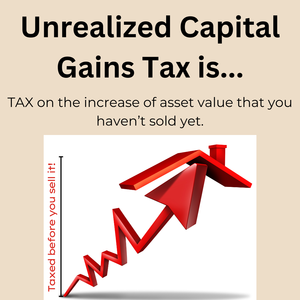
The idea of taxing unrealized capital gains has sparked heated debate, especially in the context of real estate investment. While this type of tax has not yet been fully implemented, some policy proposals have emerged, particularly targeting the wealthiest individuals whose investment assets—often including real estate—generate significant value without being taxed until the assets are sold. Understanding how such a tax could influence real estate investment requires an exploration of several key factors.
1. Liquidity Concerns
One of the central criticisms of taxing unrealized capital gains in real estate is the issue of liquidity. Real estate is an illiquid asset, meaning that its value is not easily converted into cash without selling the property. Under a tax on unrealized capital gains, investors could face tax bills on property value increases without any corresponding cash flow unless the property is sold or rented out.
This could place a burden on property owners, especially those holding long-term investments, like family-owned real estate or income properties, where profits are reinvested into maintaining or improving the property rather than being realized as immediate cash gains.
2. Impact on Real Estate Prices and Investment
Real estate investors often rely on the appreciation of property values over time, using the untaxed value growth as leverage for further investments. If unrealized gains were taxed annually, this could reduce the incentive for investors to hold properties over the long term, pushing them to sell earlier or reduce their holdings altogether. This could lead to downward pressure on real estate prices, particularly in high-value markets where appreciation has been a major draw for investors.
Conversely, this could benefit buyers in some ways by reducing competition in the market, but it could also decrease the supply of rental properties or investment in new developments, leading to broader market imbalances.
3. Decreased Investment in Development Projects
Taxing unrealized gains could particularly affect developers and those investing in large-scale projects. Real estate development often requires long time horizons, with profits typically realized only after construction is completed and properties are sold or leased. If developers are taxed on rising property values during the construction phase, they may be forced to sell assets or secure additional financing to cover the tax liabilities, which could increase the overall cost of development.
This scenario could deter investment in large projects like commercial developments, multi-family housing, or mixed-use properties. The tax burden could push developers to either scale back projects or avoid certain markets where property values tend to appreciate quickly, impacting housing supply and urban growth in key regions.
4. Shift Toward Short-Term Investments
Introducing a tax on unrealized gains could shift the focus of real estate investment toward shorter-term strategies. Investors may prioritize flipping properties or shorter holding periods to avoid paying taxes on property value appreciation that hasn’t yet been monetized. This shift would mark a significant change in the real estate market, which has traditionally favored long-term investment strategies that build wealth over time.
However, such a tax could also increase the volatility of real estate prices, as more investors rush to sell properties before valuations rise too high. The focus on short-term gains could reduce the stability of the housing market and impact broader economic trends related to real estate.
5. Effects on Rental Housing
Rental property owners may be particularly affected by a tax on unrealized capital gains. For those who generate income from rent rather than property sales, being taxed on the appreciation of property values could reduce profitability. Owners may be forced to pass on these costs to tenants through higher rent, potentially exacerbating affordability issues in certain markets.
Moreover, smaller landlords who rely on steady rental income, rather than significant property turnover, may find it difficult to manage both tax liabilities and property maintenance costs. This could drive smaller players out of the rental market, further consolidating the sector in the hands of large real estate firms or institutional investors.
Conclusion
A tax on unrealized capital gains would represent a significant shift in how real estate investment is approached and valued. While it might increase tax revenues and target wealthy investors, it could also create liquidity issues, disrupt long-term investment strategies, and impact property prices. The ripple effects could touch various aspects of the housing market, from development projects to rental affordability. Policymakers would need to carefully weigh the potential economic impacts against the goals of such a tax to ensure that it does not unintentionally destabilize real estate markets.
In short, while the idea of taxing unrealized capital gains aims to address wealth inequality, its impact on the real estate sector could be profound, reshaping the landscape of property investment and ownership.

